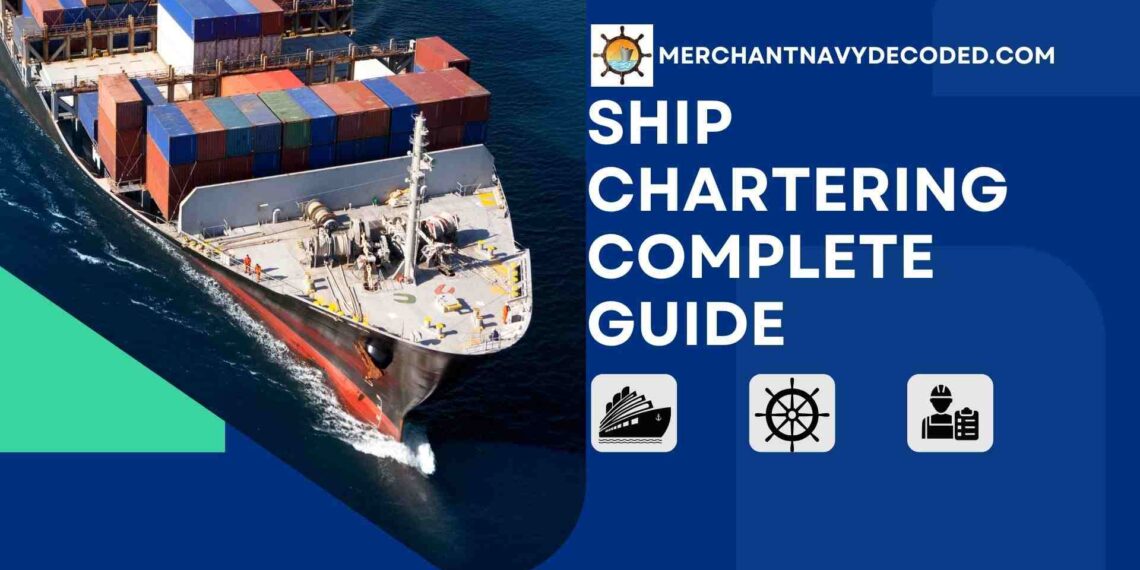Ship Chartering
Ship Chartering Overview
- Explore Ship Chartering
This article will provide you with an in-depth look into ship chartering, including discussions on the opportunities and skills required in this important part of the maritime industry.
- Learn and Apply
Gain insights into the different roles and skills required for success in ship chartering.
1:- What is Ship Chartering?

- Ship chartering is the process of hiring a ship temporarily for transporting goods or passengers, typically involving a contract between the charterer and the shipowner.
- Ship Chartering involves a contractual agreement between a shipowner (or charterer) and a party requiring the use of the ship. This agreement allows the charterer to use the vessel for a specific period or voyage, typically in exchange for payment.
- There are various chartering arrangements, including time charter, voyage charter, and bareboat charter. Each type defines the terms, duration, and responsibilities of both parties involved in the charter agreement.
- Join our free guidance series for Ship Brokering and Ship Chartering for the complete information and the procedure to become a Ship Charterer and Ship Broker from a Seafarer.
2:- Types of Ship Chartering

2.1:- Time Charter
A time charterer is someone who hires a ship for a specific period, paying a fixed rate for the vessel’s use while having control over its operations.
Structure: Involves leasing a vessel for a specific period, typically ranging from a few months to several years.
Payment Structure: Charterers pay a regular hire fee to the shipowner for the agreed-upon duration.
Control: Charterers have operational control over the vessel during the charter period, deciding on ports of call and cargo.
2:- Voyage Charter
A voyage charterer is an individual or company that charters a ship for a specific voyage or journey, typically paying for the transportation of goods or passengers.
Structure: Encompasses a single voyage or a series of voyages between specified ports.
Payment Structure: Charterers pay freight based on the quantity of cargo loaded, and the shipowner covers voyage-related expenses.
Control: Shipowners maintain operational control, deciding the vessel’s route and scheduling.
3:- Bareboat Charter
A bareboat charterer is someone who rents a ship without crew or provisions, assuming full responsibility for its operation and navigation during the charter period.
Structure: Involves leasing the entire vessel for an extended period, often with an option to purchase at the end of the charter period.
Payment Structure: Charterers pay a fixed rate and are responsible for operating expenses, similar to owning the vessel temporarily.
Control: Charterers have complete control and responsibility for the vessel’s operations, crewing, and maintenance.
3:- Types of Voyage Chartering

1. Tanker Chartering: This involves the transportation of liquid cargoes, primarily oil and its derivatives. Tanker vessels are specialized to carry large quantities of liquid bulk cargo safely and efficiently.
2. Bulk Chartering: Bulk carriers are designed to transport unpackaged bulk cargo, such as grains, coal, ore, and cement in its cargo holds. This type of chartering is common for commodities that are traded in large quantities.
3. Container Chartering: Container ships are used for the transportation of containerized cargo. This method is highly efficient for shipping a variety of goods that have been packed into containers, allowing for easy loading and unloading.
4. General Cargo Chartering: This type of chartering is for vessels that carry goods that are not liquid or bulk. These can include goods packed in bags, boxes, crates, drums, or pallets.
5. Reefer Chartering: Reefer ships are refrigerated cargo ships used for transporting perishable commodities which require temperature-controlled transportation, such as fruits, meat, fish, vegetables, dairy products, and other foods.
6. Heavy-Lift Chartering: This involves the transportation of particularly heavy or large items that cannot be broken down into smaller, lighter units. These ships are equipped with cranes to load and unload heavy cargo.
4:- Responsibilities of Ship Charterer
- Voyage Planning: The charterer takes on the task of determining the vessel’s itinerary and timing.
- Management of Cargo: The charterer is tasked with orchestrating the loading and unloading processes for the cargo.
- Security Measures: The charterer bears the responsibility for maintaining the safety of the vessel, its crew, and the cargo for the duration of the journey.
- Financial Responsibilities: In specific charter arrangements, such as a bareboat charter, the charterer is liable for all the costs associated with the vessel’s operation, which includes fuel, personnel, harbor fees, and insurance coverage.
- Contractual Negotiations: The charterer engages in the discussion and finalization of the charter party contract with the vessel owner, detailing the agreement’s stipulations and provisions.
Find out the difference between the responsibilities in Ship Chartering and Ship Brokering with our just one click.
5:- Risk and Responsibilities of a Ship Charter
5.1:- Time Charter
Risk: The shipowner bears the risk of market fluctuations and operational costs.
Responsibilities: Charterers are responsible for cargo handling, fuel costs, and port expenses.
5.2:- Voyage Charter
- Risk: The shipowner is exposed to market risks, and charterers pay freight based on cargo volume.
- Responsibilities: Shipowners handle vessel operations and voyage-related costs.
5.3:- Bareboat Charter
- Risk: Charterers bear the risk of market conditions and vessel maintenance costs.
- Responsibilities: Charterers take full responsibility for vessel operations, crewing, and maintenance.
6:- Voyage Charter vs Time Charter
A charter is a contract between two or more parties, known as charter parties, outlining the terms for leasing a vessel under specific conditions. There are primarily two types of charters:
- Voyage charter
- Time charter
In a voyage charter, a vessel is rented for a particular journey, specifying ports of call, destination, and any cargo restrictions. Typically, charterers with specific cargo shipping need to opt for voyage charters.
On the other hand, a time charter is a lease granting the charterer the vessel’s use for a defined period. The charterer pays a daily rate for vessel use, while the shipowner remains responsible for operating expenses during this timeframe.
7:- Ship Chartering Jobs
Ship chartering is a key aspect of maritime logistics, involving the leasing of ships for transporting goods. It offers various career opportunities such as brokering charter agreements and overseeing vessel operations. This field is critical for facilitating global trade by ensuring the smooth movement of goods across oceans. Whether you’re interested in negotiation, operational management, or other aspects of the industry, ship chartering presents a wide range of rewarding career paths within the maritime logistics sector.
Some Jobs in Ship Chartering involves:
7.1:- Charter Broker
Role: Facilitating charter agreements between shipowners and charterers.
Opportunity: Engage in negotiations, analyze market trends, and build relationships with clients to secure favorable charter deals.
7.2:- Operations Manager
Role: Overseeing the day-to-day operations of chartered vessels.
Opportunity: Manage vessel schedules, ensure compliance with charter agreements, and troubleshoot any operational issues.
7.3:- Freight Trader
Role: Trading in freight contracts, predicting market trends, and optimizing cargo movements.
Opportunity: Engage in dynamic market activities, utilizing market intelligence to make profitable trading decisions.
7.4:- Charterer Representative
Role: Representing charterers in negotiations with shipowners.
Opportunity: Advocate for favorable terms and conditions in charter agreements, protecting the charterer’s interests.
8:- Skills Required to Become a Ship Charterer

- Negotiation Skills
Successful ship chartering often depends on effective negotiation skills. Brokers and charterers must navigate discussions adeptly to secure favorable terms and agreements. The ability to negotiate ensures that charterers get optimal deals, shipowners receive fair terms, and all parties involved are satisfied with the agreement.
- Market Intelligence
Keeping up with shipping market trends, vessel availability, and freight rates is critical. A deep understanding of market dynamics helps in making informed decisions.
- Clear Communication
Ship chartering involves constant communication between charterers, shipowners, and various stakeholders. Clear and concise communication is vital for smooth operations. Effective communication ensures that all parties are on the same page, preventing misunderstandings and facilitating seamless chartering processes.
- Analytical Thinking
Analyzing shipping data, market conditions, and contractual terms requires analytical thinking. This skill is essential for understanding complex variables and making strategic decisions.
- Relationship Building
Establishing and maintaining strong relationships with clients, shipping companies, and other industry stakeholders is crucial. Building lasting relationships fosters trust and enhances the likelihood of successful collaborations, providing a foundation for long-term success in ship chartering.
9:- Where and How to Apply for Ship Chartering
9.1:- Maritime Job Portals
How to Apply:
- Create a comprehensive profile on reputable maritime job portals.
- Upload a well-crafted resume highlighting relevant skills and experiences.
- Browse through posted ship chartering positions and apply directly through the portal.
Where to Apply:
- Maritime Jobs: Platforms like MarineLink, Sea Career, and Martide often feature ship chartering positions.
- General Job Portals: Explore broader job portals like Indeed or LinkedIn, filtering for maritime and ship chartering roles.
9.2:- Networking Events and Conferences
How to Apply:
- Attend maritime events, conferences, and seminars.
- Network with professionals in the industry and express your interest in ship chartering positions.
- Collect business cards and contact information for potential leads.
Where to Apply:
- Trade Shows: Attend industry-specific trade shows such as Posidonia or NorShipping.
- Maritime Conferences: Participate in conferences like CMA Shipping or the International Maritime Forum.
9.3:- Company Websites
How to Apply:
- Regularly check the careers section on shipping companies’ websites.
- Submit online applications through the company’s official job portal.
- Follow application instructions meticulously.
Where to Apply:
- Major Shipping Companies: Check the websites of renowned shipping companies like Maersk, CMA CGM, or Mediterranean Shipping Company.
- Specialized Broking Firms: Explore websites of firms specializing in ship brokering, as they often have chartering positions.
9.4:- Online Professional Communities
How to Apply:
- Join online maritime communities and forums.
- Engage in discussions, showcase your expertise, and express your job-seeking status.
- Utilize community job boards for potential opportunities.
Where to Apply:
- LinkedIn Groups: Join maritime-focused groups on LinkedIn and explore job postings.
- Forums like gCaptain: Participate in discussions on platforms like gCaptain, where job opportunities are sometimes shared.
9.5:- Recruitment Agencies
How to Apply:
- Register with maritime-focused recruitment agencies.
- Submit your resume and express your interest in ship chartering positions.
- Stay in regular contact with the agency for updates on potential opportunities.
Where to Apply:
- Agencies such as Spinnaker Global or Faststream often specialize in maritime recruitment.
10:- Ship Charterer Salary

The expected salary in ship chartering is influenced by diverse factors, including job type, geographical location, and the individual’s experience level. Let’s explore salary expectations across various roles within the ship chartering domain:
10.1:- Average Salary of a Ship Charterer in India
The average salary for shipping chartering jobs in India stands at ₹5 lakhs per year and can go up to ₹60 lakhs per year with experience.
This figure serves as a baseline, with variations dependent on factors like experience, qualifications, and the specific location within India.
10.2:- Factors Influencing Salary in Ship Chartering
Experience Level:
- Impact: Professionals with more years of experience typically command higher salaries.
- Consideration: You can anticipate salary growth as you accumulate experience in ship chartering.
Geographical Location:
- Impact: Salaries can vary significantly based on the region or country.
- Consideration: Urban areas and maritime hubs may offer higher compensation due to increased demand and cost of living.
Qualifications and Skills:
- Impact: Advanced qualifications and specialized skills may lead to enhanced earning potential.
- Consideration: Continuous upskilling and obtaining relevant certifications can positively impact your market value.
Check out the Ship Brokering salary with our dedicated article on Ship Brokering and choose the best possible career for you.
11:- Conclusion

Ship chartering is a dynamic and rewarding career within the maritime industry. From brokering crucial agreements to overseeing vessel operations, the opportunities are vast. Success in this field demands a unique set of skills, continuous upskilling, and a keen understanding of the ever-changing maritime landscape.
Disclaimer :- The opinions expressed in this article belong solely to the author and may not necessarily reflect those of Merchant Navy Decoded. We cannot guarantee the accuracy of the information provided and disclaim any responsibility for it. Data and visuals used are sourced from publicly available information and may not be authenticated by any regulatory body. Reviews and comments appearing on our blogs represent the opinions of individuals and do not necessarily reflect the views of Merchant Navy Decoded. We are not responsible for any loss or damage resulting from reliance on these reviews or comments.
Reproduction, copying, sharing, or use of the article or images in any form is strictly prohibited without prior permission from both the author and Merchant Navy Decoded.





can you provide us charter contact for knowing ship chartering.
Hey Vikram, we currently do not provide any information regarding charter contact.
HAI BRO, HOW CAN WE KNOW THE CHARTER& OWNERS DETAILIS BEFORE LAYCAN OF VESSEL